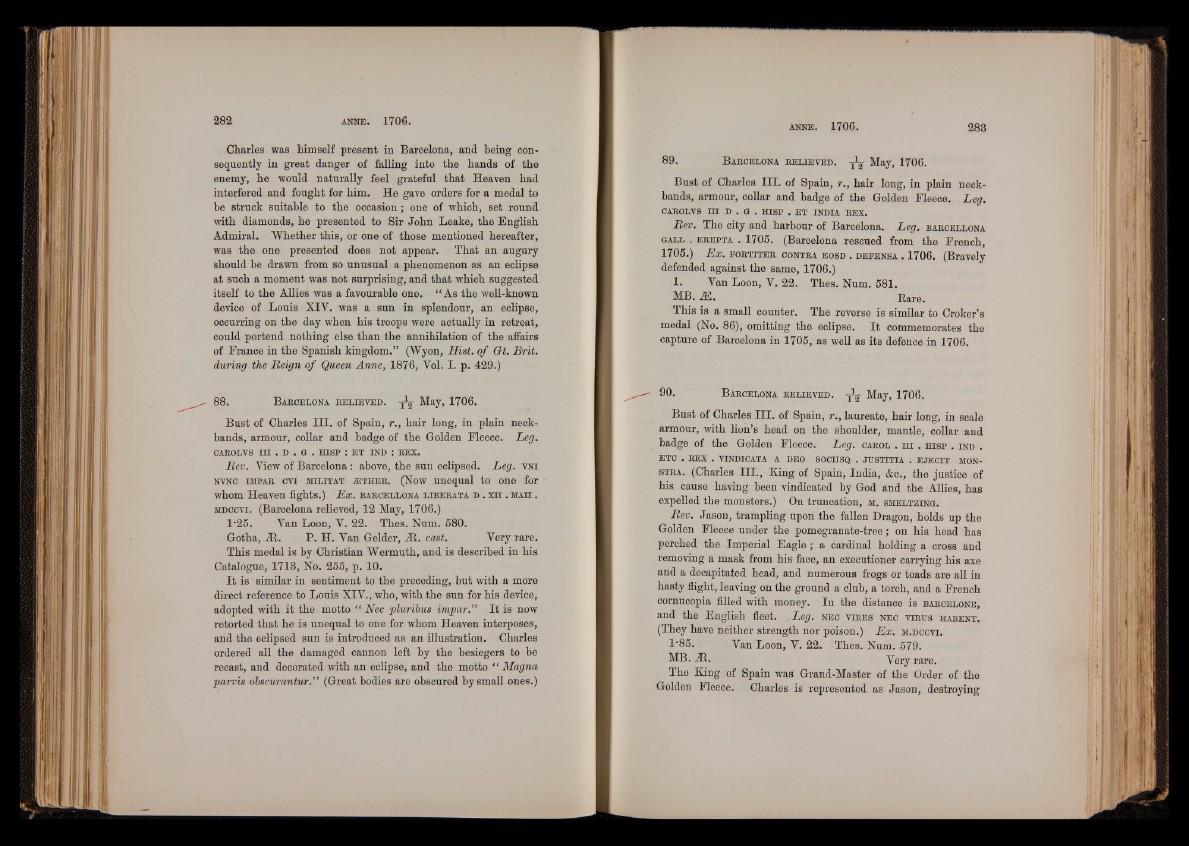
Charles was himself present in Barcelona, and being consequently
in great danger of falling into the hands of the
enemy, he would naturally feel grateful that Heaven had
interfered and fought for him. He gave orders for a medal to
he struck suitable to the occasion; one of which, set round
with diamonds, he presented to Sir John Leake, the English
Admiral. Whether this, or one of those mentioned hereafter,
was the one presented does not appear. That an augury
should be drawn from so unusual a phenomenon as an eclipse
at such a moment was not surprising, and that which suggested
itself to the Allies was a favourable one. “ As the well-known
device of Louis XIV. was a sun in splendour, an eclipse,
occurring on the day when his troops were actually in retreat,
could portend nothing else than the annihilation of the affairs
of France in the Spanish kingdom.” (Wyon, Hist, of Gt. Brit,
during the Reign of Queen Anne, 1876, Vol. I. p. 429.)
88. B a r c e lo n a r e l ie v e d , -pj May, 1706.
Bust of Charles HI. of Spain, r., hair long, in plain neckbands,
armour, collar and badge of the Golden Fleece. Leg.
CAROLVS I I I . D . G . HISP : ET IND : REX.
Rev. View of Barcelona : above, the sun eclipsed. Leg. v n i
nvnc im pa r cvi m il it a t ¿e t h e r . (Now unequal to one for
whom Heaven fights.) Ex. b a r c e l lo n a l ib e r a t a d . x i i . m a i i .
m dc c v i. (Barcelona relieved, 12 May, 1706.)
l -25. Van Loon, V. 22. Thes. Num. 580.
Gotha, At. P. H. Van Gelder, At. cast. Very rare.
This medal is by Christian Wermuth, and is described in his
Catalogue, 1713, No. 255, p. 10.
It is similar in sentiment to the preceding, but with a more
direct reference to Louis XIV., who, with the sun for his device,
adopted with it the motto “ Nec pluribus impar.” It is now
retorted that he is unequal to one for whom Heaven interposes,
and the eclipsed sun is introduced as an illustration. Charles
ordered all the damaged cannon left by the besiegers to be
recast, and decorated with an eclipse, and the motto “ Magna
parvis obscurantur.” (Great bodies are obscured by small ones.)
89. B a r c e lo n a r e l ie v e d . May, 1706.
Bust of Charles III. of Spain, r., hair long, in plain neckbands,
armour, collar and badge of the Golden Fleece. Leg.
CAROLVS I I I D . G . HISP . ET INDIA REX.
Rev. The city and harbour of Barcelona. Leg. b a r c e l lo n a
g a l l . e r e p t a . 1705. (Barcelona rescued from the French,
1705.) Ex. f o r t it e r contra eo s d . d e f e n s a . 1706. (Bravely
defended against the same, 1706.)
1. Van Loon, V. 22. Thes. Num. 581.
MB. AS. ■ Bare.
This is a small counter. The reverse is similar to Croker’s
medal (No. 86), omitting the eclipse. It commemorates the
capture of Barcelona in 1705, as well as its defence in 1706.
90. B a r c e lo n a r e l ie v e d . A j M a y , 1706.
Bust of Charles III. of Spain, r., laureate, hair long, in scale
armour, with lion’s head on the shoulder, mantle, collar and
badge of the Golden Fleece. Leg. carol . m . h i s p . in d .
ETC . REX . VTNDICATA A DEO SOCIISQ . JUSTITIA . EJECIT MON-
s t r a . (Charles IH., King of Spain, India, &c., the justice of
his cause having been vindicated by God and the Allies, has
expelled the monsters.) On truncation, m . sm e l t z in g .
Rev. Jason, trampling upon the fallen Dragon, holds up the
Golden Fleece under the pomegranate-tree; on his head has
perched the Imperial Eagle ; a cardinal holding a cross and
removing a mask from his face, an executioner carrying his axe
and a decapitated head, and numerous frogs or toads are all in
hasty flight, leaving on the ground a club, a torch, and a French
cornucopia filled with money. In the distance is b a r c e l o n e ,
and the English fleet. Leg. n e c v ir e s n e c v ir u s h a b e n t .
(They have neither strength nor poison.) Ex. m .d c c v i.
1'85. Van Loon, V. 22. Thes. Num. 579.
MB. At. Very rare.
The King of Spain was Grand-Master of the Order of the
Golden Fleece. Charles is represented as Jason, destroying